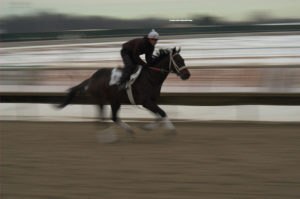From the Central Penn Business Journal:
By Jason Scott
The Pennsylvania horse-racing industry is betting on the young.
Officials are ramping up marketing efforts in hopes of attracting a youthful audience and regaining ground that the sport of kings has lost over the last decade to other forms of gambling.
The decline is evident in the stands.
Attendance at the state’s six racetracks fell 7 percent between 2016 and 2017, according to the last annual racetrack report from the Pennsylvania Gaming Control Board.
But officials also have their eyes on an aging cadre of horse owners, and say they want to pique the interest of a new generation.
To combat the decline, associations that represent horse-racing owners, breeders and trainers last year formed the Pennsylvania Horse Racing Association, a statewide umbrella group, and hired Harrisburg-based Pavone to craft a new marketing strategy for the industry.
The marketing effort includes a new website, outreach efforts, event promotion and multimedia productions.
Horse racing draws an older audience, typically people between 40 and 60, said Ashley Eisenbeil, the association’s director of marketing.
She said the initiative aims to get more millennials to attend and bet on races – and maybe even pursue ownership of race horses.
“It’s an experience people need to have to get hooked in and stay,” said the 35-year-old, who has been around the industry for eight years and is now looking to buy a horse. “We want to focus on the millennial age group because that is the future.”
In person and online
Horse racing in the commonwealth has been overshadowed by the rise and expansion of legalized gambling at casinos. Pennsylvania also has legalized sports betting, which poses even more competition for racetracks fighting to keep their share of gambling dollars.
However, casino competitors kick in about $240 million in slot-machine revenue each year toward subsidizing the racing industry. The money goes into the Pennsylvania Race Horse Development Trust Fund, which helps to cover race purses, health care and pensions for industry employees and funding for special races for Pennsylvania-born horses, among other activities.
The Pennsylvania Horse Racing Association tapped a small portion of the revenue to hire Pavone.
In addition to developing a new website and new social media channels, the association is attending more events to spread its message. Jockeys were on hand at the Pennsylvania Farm Show, for example, to meet potential fans.
“Grassroots is where we start getting the push to the website and get them to the track,” Eisenbeil said. “It’s about being more approachable.”
Association President Pete Peterson said he believes the website will help lower hesitation about going to a track and betting on a race, especially among casual fans who may only tune in for Triple Crown events in the spring or the Breeders’ Cup in the fall.
The website, PennHorseRacing.com, went live this year. It offers a blend of information for new and seasoned fans, from primers on the differences between thoroughbred and harness races to how to place a wager.
He said the association also will rely on more digital advertising and social media platforms to reach younger people. In addition, the association is looking for opportunities to add more special races across the state throughout the season, which could attract people to the tracks.
The online strategy, meanwhile, will include more videos that focus on behind-the-scenes action. Eisenbeil said she plans to partner with local horse breeders to share the experience of being on a working farm and educate people about ownership. She also hinted at creating more insider experiences by filming owners and jockeys in training as they prepare for races.
“We’re definitely pushing more toward videos and live streaming,” said Eisenbeil, who hopes to push out short clips on a weekly or monthly basis.
Other big racing venues have dabbled in virtual-reality and 360-degree broadcasts of events like the Breeders’ Cup. Eisenbeil said integrating that type of technology to enhance the experience for fans is on her radar.
“I hope we can do some of that stuff,” she said.
Jennifer Starr, racing marketing manager for The Downs at Mohegan Sun Pocono, a harness racing track in Luzerne County, said she believes the new initiative will resonate with a younger audience.
“There is a lot that goes into getting a horse ready for race night,” she said. “It’s good to introduce the personalities, the drivers and trainers and introduce them to the public.”
If the association can connect with people on the site and deliver good content, she said more people will hit the track this year.
“Nothing beats seeing it live,” she said. “Nothing beats the excitement or energy of live harness racing or live racing, period.”
Competing for dollars
However, as the marketing push by the association accelerates, officials remain concerned about the growth of other forms of gambling in Pennsylvania and what it could mean for horse racing.
Racetracks fear that people may be splitting their gambling dollars among a variety of activities. Horse racing was once the only game in town, but the industry has had to adjust to new casino and entertainment options that have developed around the tracks.
“It’s a concern in some respects,” Peterson said.
At the same time, Peterson acknowledges that the new mini-casinos approved as part of the 2017 gambling expansion law in Pennsylvania may help increase slots revenue statewide. That could mean more money for racing.
Sportsbooks could also entice more people to wager money on horse races, especially those books that incorporate horse racing.
Whether the expansion efforts complement or compete with horse racing remains to be seen.
Horse racing officials remain focused on their piece and positioning Pennsylvania to be like Kentucky, which is known for thoroughbred breeding and racing. Pennsylvania is home to Hanover Shoe Farms in Adams County, a recognized world leader for standardbred horses.
“We are one of the top states for standardbred horses,” Eisenbeil said. “We should be talking about that and capitalizing on that reputation.”